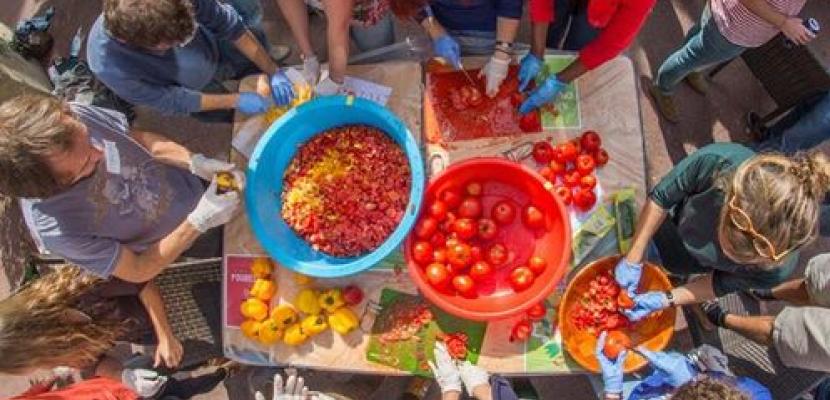Image

Disco Soupe encourages citizen participation and food waste prevention
Published on 30 March 2021

France
This is the good practice's implementation level. It can be national, regional or local.
About this good practice
According to a study conducted by the Food and Agriculture Organization of the United Nations (FAO), 1/3 of all food produced for human consumption worldwide is either lost or wasted. Each year 1.3 billion tons of perfectly edible, safe, and nutritious food is not eaten. For instance, vegetables are rejected because of little aesthetic irregularities; bumps, or spots, or because the vegetable does not meet the required form, size, and color standards.
This good practice encourages active citizen participation by organizing gatherings in public places to chop unsellable and rejected produce like fruits and vegetables (which would otherwise have been wasted) and made into soups and salads in huge quantities and enjoyed with music.
Any group can organize and implement Disco Soupes and raise awareness about food waste. Organizers of Disco Soupes implement local ecosystems to gather food waste and to borrow required equipment. Participants are attracted by the fun of joining a Disco Soupe and end up understanding better the concept of food waste and how to minimize waste with easy recipes. Individual and collective solutions can thus be adopted to prevent food waste, Markets and supermarkets involved are diminishing their amount of food waste which reduces waste disposal costs.
This good practice encourages active citizen participation by organizing gatherings in public places to chop unsellable and rejected produce like fruits and vegetables (which would otherwise have been wasted) and made into soups and salads in huge quantities and enjoyed with music.
Any group can organize and implement Disco Soupes and raise awareness about food waste. Organizers of Disco Soupes implement local ecosystems to gather food waste and to borrow required equipment. Participants are attracted by the fun of joining a Disco Soupe and end up understanding better the concept of food waste and how to minimize waste with easy recipes. Individual and collective solutions can thus be adopted to prevent food waste, Markets and supermarkets involved are diminishing their amount of food waste which reduces waste disposal costs.
Expert opinion
France is a front runner when it comes to avoidance of food waste through its law on fighting food waste that meant supermarkets were forbidden to destroy unsold food products and were compelled to donate it instead since 2016.
This good practice takes a complementary approach by organising the use of the otherwise to be wasted food in public fun events. Fun is an important ingredient in mobilising ordinary citizens for circular economy initiatives. This nice good practice is very replicable, serves the environment and the local community with a good vibe. Of interest to every town and region that wishes to raise awareness about food waste and bring together the community while doing it.
This good practice takes a complementary approach by organising the use of the otherwise to be wasted food in public fun events. Fun is an important ingredient in mobilising ordinary citizens for circular economy initiatives. This nice good practice is very replicable, serves the environment and the local community with a good vibe. Of interest to every town and region that wishes to raise awareness about food waste and bring together the community while doing it.
Works at
Interreg Europe Policy Learning Platform
Resources needed
In general to organize a Disco Soupe for 100 people requires:
-3 to 5 people spending 2 working days each (coordinator, communication, logistics, event facilitator, artists, or DJ)
-Reusable cutlery (cups, forks)
-Collective kitchen equipment (pans, gas burner)
-Music
-30€ for reimbursed gas co
-3 to 5 people spending 2 working days each (coordinator, communication, logistics, event facilitator, artists, or DJ)
-Reusable cutlery (cups, forks)
-Collective kitchen equipment (pans, gas burner)
-Music
-30€ for reimbursed gas co
Evidence of success
Since 2012, up to 1000 Disco Soupes have been organized worldwide, 2/3 of them being led by third sector initiatives or autonomous groups with an organization cost that is close to zero. More than 200 tonnes of food have been saved from disposal while 50000 participants have joined and twice as many have been reached by awareness material.
Potential for learning or transfer
The problem with the potential for the transfer of such good practice is the current Covid-19 pandemic, thus similar practices are canceled or on hold. However, any organization can easily organize a Disco Soupes even if they have very little experience. It is easy to mobilize volunteers, supermarkets, and participants. Start a local association in any city with a few hundred euros spent on for instance community-building workshops and equipment. Furthermore, all the Disco Soupes methods are available on a virtual toolkit and anyone can ask for help on social media, or to local or international organizations that have previous experience with implementing a Disco Soupe.
The concept has reached some international press coverages.
The concept has reached some international press coverages.
Further information
Website
Good practice owner
You can contact the good practice owner below for more detailed information.
Organisation
None

France
Ile-de-France
Contact
Community organizer
